10 Low-Maintenance Landscaping Ideas for Louisville
BY RELA CATUCOD | MARCH 25TH, 2023 | KENTUCKY, LANDSCAPING, LOUISVILLEYour weekends in Louisville should be spent sipping mint juleps or cheering for your favorite horses at Churchill Downs instead of tirelessly working on your lawn care. It’s time to explore low-maintenance landscaping ideas that minimize outdoor chores and maximize your leisure time in the Bluegrass State.
With low-maintenance landscape design, you can save time, effort, water, and reduce the need for weeding, mowing, and managing pests. You can also strike the perfect balance between a stunning landscape and a relaxing weekend.
In this article, we’ll delve into:
- Perennials for Continuous Charm
- Embracing Kentucky Native Plants
- Mulching Your Garden Beds
- Eco-Friendly Hardscaping
- Rain Gardens for Water Conservation
- Ground Cover for Less Mowing
- Artificial Grass: A No-Mow Alternative
- Hardy Succulents
- Effortless Elegance with Ornamental Grasses
- Container Gardening for Limited Spaces
1. Perennials for Continuous Charm
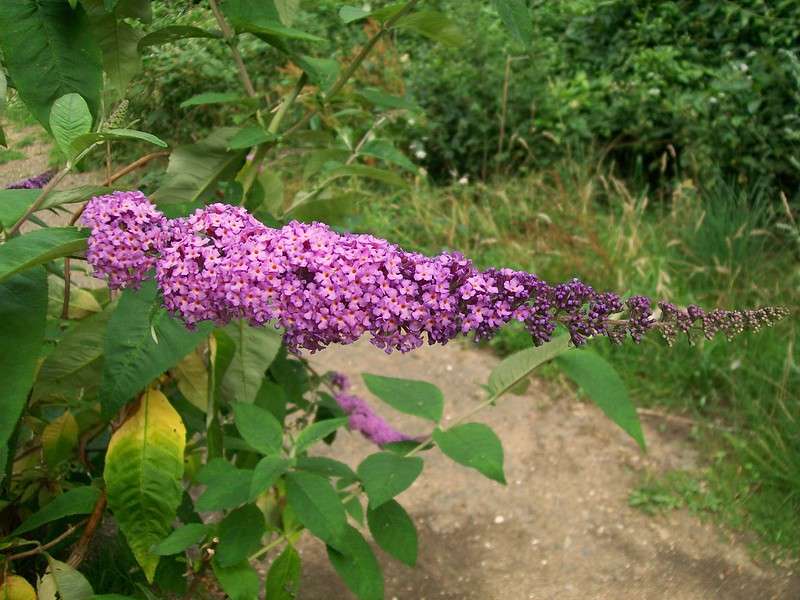
Photo Credit: Peter O’Connor aka anemoneprojectors / Flickr / CC BY-SA 2.0
Annuals may be eye-catching with their vibrant colors, but they only last one growing season. For a more sustainable and low-maintenance option, consider switching to drought-tolerant perennials suitable for full sun or partial shade in your front yard or garden design.
Drought-tolerant perennials are a practical choice because they need less water and maintenance, and they return year after year. These plants not only provide beautiful blooms, but also attract pollinators like bees, butterflies, and hummingbirds, promoting a healthy ecosystem in your yard. By choosing perennials that are adapted to Louisville’s climate and sunlight conditions, you can create an attractive and low-maintenance garden that enhances your outdoor space.
Some heat-tolerant perennials for Louisville include:
- Butterfly Bush (Buddleia)
- Threadleaf Coreopsis (Coreopsis)
- Cheddar Pink (Dianthus)
- Purple Coneflower (Echinacea)
- Daylily (Hemerocallis)
Advantages of perennials:
- Bloom yearly
- Last 10 to 20 years or more
- Improve soil structure
- Prevent erosion
- Water and nutrient-efficient
Estimated cost: The average cost of a perennial plant varies depending on the size and type of plant, purchase location, and whether you are having a professional handle your landscaping. If you head to your local store to purchase your own perennials, you can expect to spend between $10 to $100 per plant.
2. Embracing Kentucky Native Plants
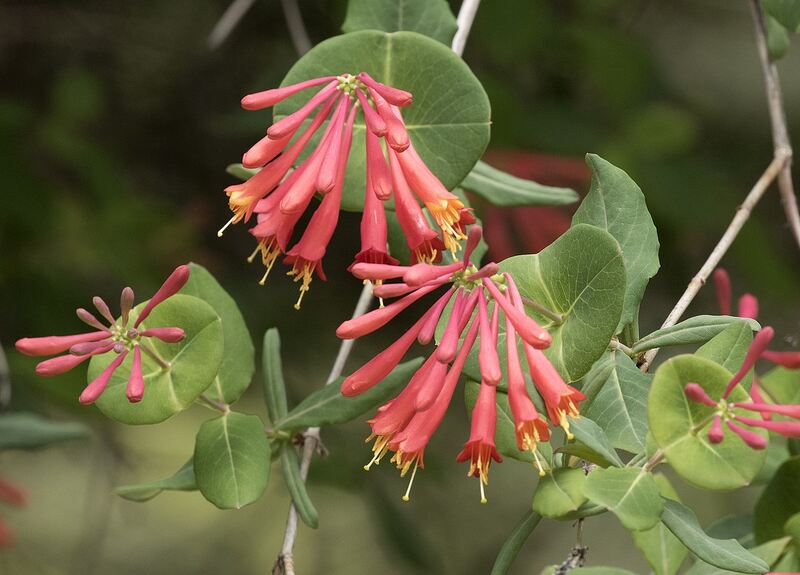
Photo Credit: Zeynel Cebeci / Wikimedia Commons / CC BY-SA 4.0
Native plants are the easiest-to-care-for greenery you can add to your Louisville garden layout. They support a lively habitat and flourish in Louisville’s weather while being tough enough to endure the chilly season.
Native plants often have a natural resistance to common pests and diseases found in the area, reducing the need for pest control or constant lawn care. Incorporating these plants into your garden design not only simplifies maintenance but also supports the local ecosystem and enhances the overall beauty of your yard.
Some Louisville native plants to consider include:
- Coral honeysuckle (lonicera sempervirens)
- Sensitive fern (onoclea sensibilis)
- Swamp milkweed (asclepias incarnata)
- Eastern redbud (cercis canadensis)
Advantages of native plants:
- Minimal care required
- Perfectly suited to Louisville’s climate
- Winter resilience
- Fosters a balanced, healthy ecosystem
- Resistant to local pests and diseases
- Efficient water usage
- Attracts and supports native wildlife
- Little to no fertilizer required
Estimated cost: Native plant prices can vary depending on the species and size, with an average price range between between $5 to $30 per plant, $15 to $50 per shrub, $5 to $50 per vine, and $200 to $1,500 per tree.
3. Mulching Your Garden Beds
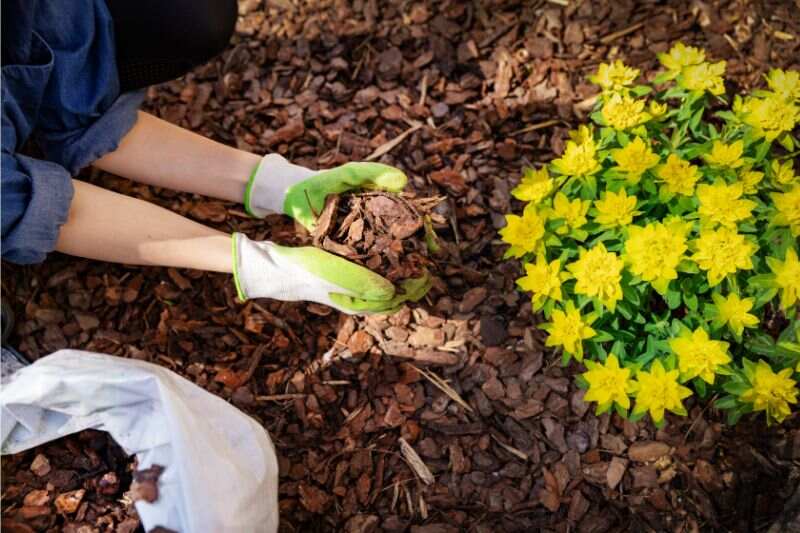
Photo Credit: ronstik / Canva Pro / License
Mulching is an excellent low-maintenance landscaping solution for Louisville locals, as it provides numerous benefits for both plants and gardeners. It helps retain moisture, reduce weeds, and insulates plant roots from extreme temperatures. This makes plants healthier and easier to care for.
Moreover, organic mulches like wood chips or tree bark decompose, adding nutrients back to the soil. As a result, mulching is a practical and eco-friendly option for creating beautiful, low-maintenance landscapes.
Organic mulch:
- Compost
- Tree bark
- Wood chips
- Shredded leaves
- Pine needles
- Straw
- Grass clippings
Inorganic mulch:
- Gravel, pebbles, lava rock
- Crushed stone
- Rubber mulch
- Landscape fabric
- Plastic sheeting
- Recycled glass mulch
Advantages of mulch:
- Effective weed suppression
- Enhanced moisture retention
- Soil temperature insulation
- Reduced soil erosion
- Nutrient-rich soil enrichment
- Improved garden aesthetics
Estimated cost: Typically, the majority of homeowners spend around $17 to $68 per cubic yard of mulch or $2 to $5.50 per bag. Should you choose to have it professionally installed, anticipate an added cost of $20 to $45 per cubic yard or $43 to $98 per hour.
4. Eco-Friendly Hardscaping
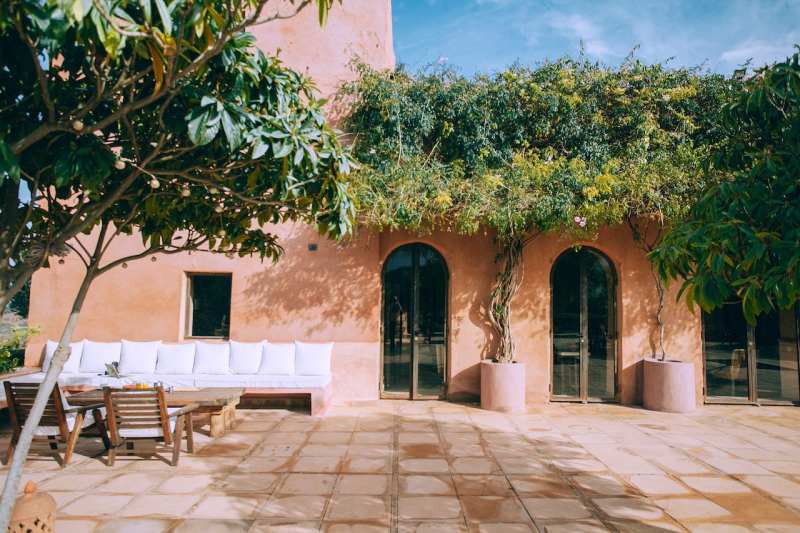
Photo Credit: Pexels
Hardscaping is a landscaping technique that involves using non-living elements, such as rocks, pavers, or concrete, to create functional and aesthetically pleasing outdoor spaces. It’s an excellent option for homeowners looking to create visually appealing outdoor spaces that require less time and effort to maintain.
Incorporating hardscaping elements, such as walkways, patios, retaining walls, and decorative stone borders, can help minimize the need for constant upkeep like mowing, weeding, and watering. These features not only enhance the overall appearance of your outdoor space but also provide functional areas for activities and entertainment.
Hardscape features include:
- Decks
- Patios
- Pergolas
- Garden paths
- Decorative stones
- Fire pits
- Rock gardens
- Water features
Advantages of hardscapes:
- Low-maintenance landscaping
- Increased property value
- Defined outdoor living spaces
- Erosion control on slopes
- Improved accessibility
- Enhanced aesthetics
- Customizable designs
Estimated cost: Prepare to invest between $15 to $30 per square foot for a new deck, depending on your choice of pressure-treated pine or composite deck material. The average cost of a 280-square-foot paver patio is $3,350, while a basic pergola comes in at approximately $4,000.
5. Rain Gardens for Water Conservation
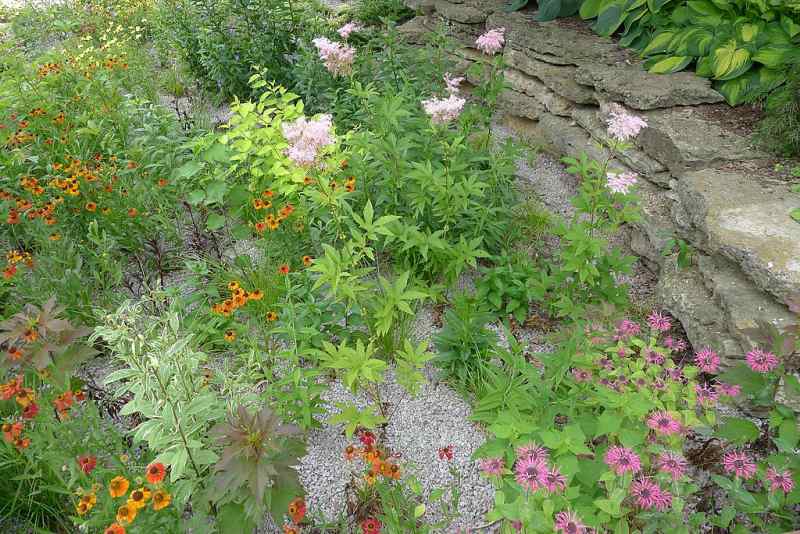
Photo Credit: James Steakley / Wikimedia Commons / CC BY-SA 4.0
Rain gardens are a sustainable and low-maintenance landscaping feature designed to capture and absorb stormwater runoff from roofs, driveways, and other impervious surfaces. These gardens help prevent flooding, reduce water pollution, and recharge groundwater, making them an eco-friendly addition to any landscape.
In addition to their environmental benefits, rain gardens also offer aesthetic appeal. With a variety of native plants, they create a visually attractive space that attracts birds, butterflies, and other pollinators. This contributes to a healthier and more diverse ecosystem in your yard.
Advantages of rain gardens:
- Conserve water
- Improve water quality
- Reduce flooding and erosion
- Attract pollinators and wildlife
Estimated cost: The cost of installing a rain garden depends on its size and complexity. On average, expect to spend between $3 to $5 per square foot for a DIY project or $10 to $20 per square foot for a professionally installed rain garden.
6. Groundcover for Less Mowing
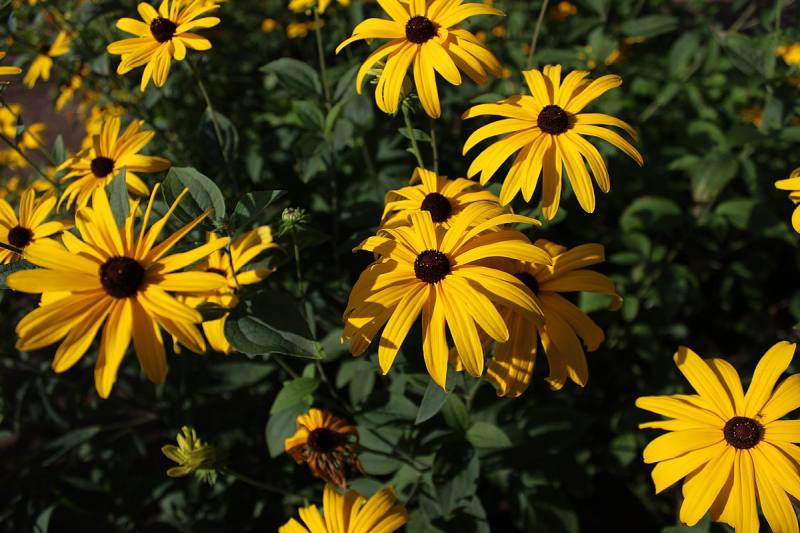
Photo Credit: AfroBrazilian: Aleksandrs Balodis / Wikimedia Commons / CC BY-SA 4.0
Groundcover plants are low-growing, spreading plants that form a dense mat over the soil surface, making them a valuable addition to low-maintenance landscapes. By effectively covering bare soil, these plants help prevent soil erosion, suppress weed growth, and retain moisture, resulting in less time spent on watering, weeding, and other maintenance tasks.
Some popular Louisville groundcovers include:
- Sweet Coneflower (Rudbeckia subtomentosa)
- Purple Milkweed (Asclepias purpurea)
- Scarlet Bee Balm (Monarda didyma)
Advantages of groundcovers:
- Weed suppression assistance
- Soil erosion prevention
- Low-maintenance alternative to grass
- Aesthetic appeal improvement
- Habitat creation for beneficial insects
- Filling gaps in garden design
- Reduced need for chemical herbicides
Estimated cost: Ground cover plants cost around $4 to $40 each, depending on size and variety.
7. Artificial Grass: A No-Mow Alternative
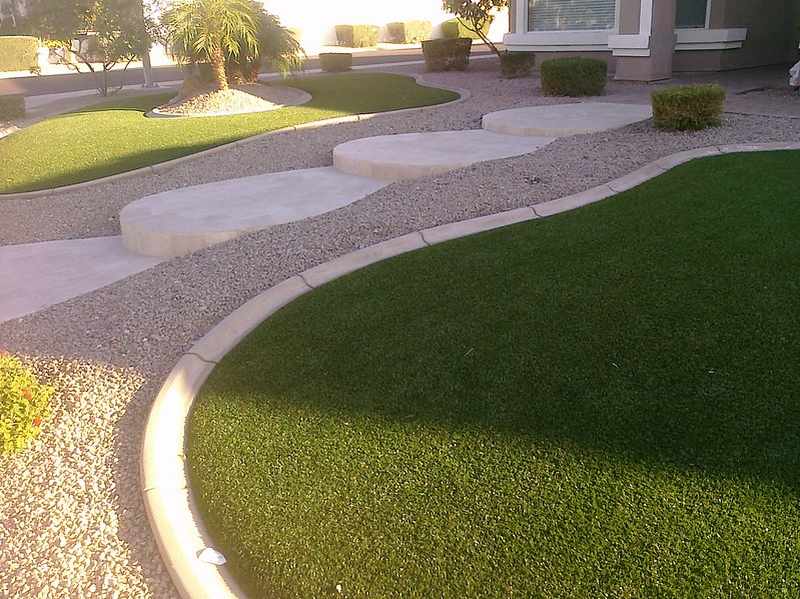
Photo Credit: Nick Bastian / Flickr / CC BY-ND 2.0
Artificial grass, also known as synthetic turf, is a popular low-maintenance landscaping option that replicates the look and feel of natural grass without the need for regular mowing, watering, or fertilizing. Made from durable synthetic fibers, artificial grass is designed to withstand heavy foot traffic, making it an excellent choice for homeowners seeking a low-maintenance, long-lasting lawn solution.
Artificial grass is also an eco-friendly option, as it reduces the need for chemical fertilizers and pesticides, which can negatively impact local ecosystems and water sources. It also ensures your lawn will have a vibrant and green appearance year-round, regardless of weather conditions or seasonal changes. By installing artificial grass in your landscape, you won’t have to contact a landscaping service to keep your lawn green throughout the year.
Advantages of artificial grass:
- No mowing required
- Water-efficient
- Pest-resistant
- Durable and long-lasting
Estimated cost: The cost of artificial grass varies depending on the type, quality, and installation. On average, expect to pay between $5 to $20 per square foot for materials and installation.
8. Hardy Succulents
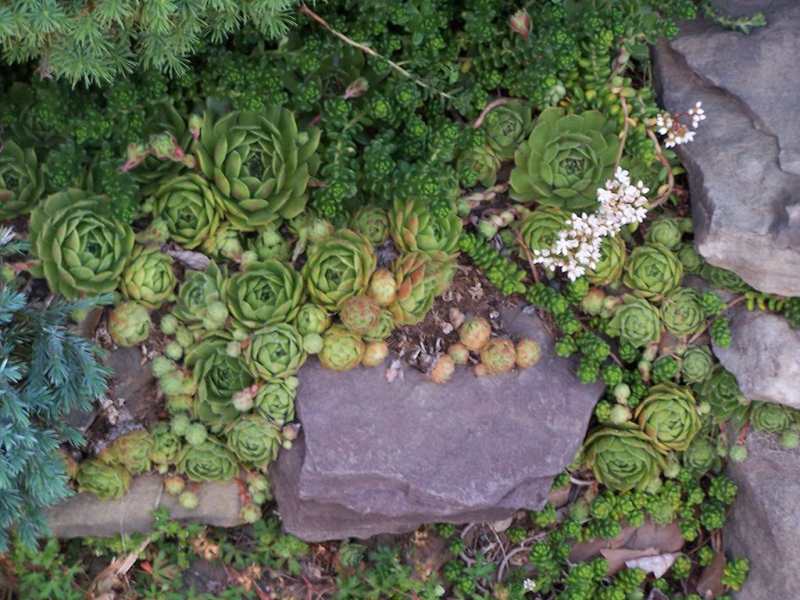
Photo Credit: Robpinion / Wikimedia Commons / Public domain
Succulents are a diverse group of plants characterized by their ability to store water in their thick, fleshy leaves, stems, or roots. This unique adaptation makes them an ideal choice for low-maintenance landscaping, as they require minimal watering and care to thrive. With a wide range of shapes, sizes, and colors available, succulents offer endless possibilities for creating visually appealing and easy-to-maintain outdoor spaces in Louisville.
Some hardy succulents for Louisville gardens include:
- Aloe Vera (Aloe barbadensis Miller)
- Hens & Chicks (Sempervivum tectorum)
- Jade Plant (Crassula ovata)
- Burro’s Tail (Sedum morganianum)
Advantages of succulents:
- Drought-tolerant
- Low-maintenance
- Unique textures and colors
- Suitable for various garden styles
Estimated cost: The price of succulents depends on factors such as size, variety, and location. Typically, you can expect to spend between $3 to $15 per plant.
9. Effortless Elegance with Ornamental Grasses
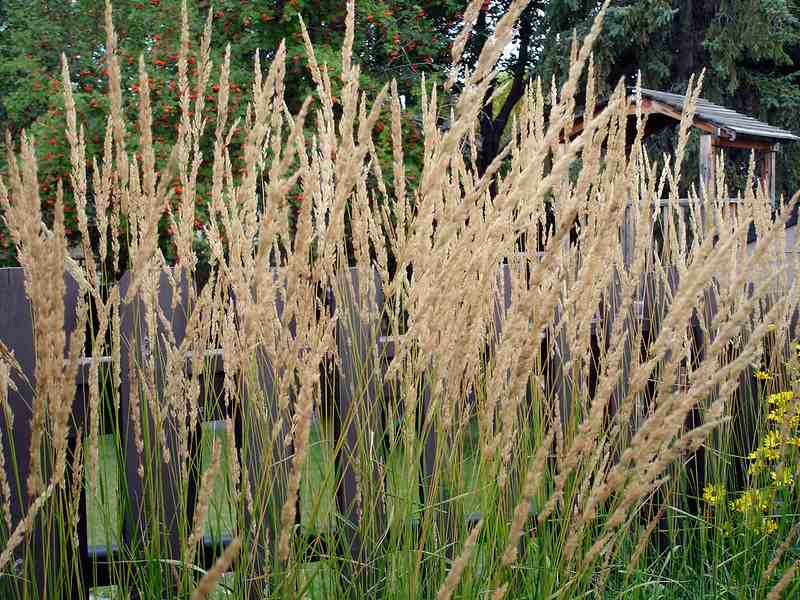
Photo Credit: daryl_mitchell / Flickr / CC BY-SA 2.0
Ornamental grasses are low-maintenance, versatile plants that add texture, movement, and color to your Louisville landscape. They thrive in various conditions, including full sun to partial shade, and are well-suited to Kentucky’s climate. Ornamental grasses come in a wide range of sizes, colors, and growth habits, making them an excellent choice for any garden design.
Some ornamental grasses for Louisville landscapes include:
- Karl Foerster Reed Grass (Calamagrostis x acutiflora)
- Northwind Switch Grass (Panicum virgatum)
- Elijah Blue Fescue (Festuca glauca)
- Hameln Dwarf Grass (Pennisetum alopecuroides)
Advantages of ornamental grasses:
- Low-maintenance
- Drought-tolerant
- Provide year-round interest
- Versatile and suitable for various garden styles
Estimated cost: The cost of ornamental grasses varies depending on the size, variety, and location. On average, expect to spend between $8 to $25 per plant.
10. Container Gardening for Limited Spaces
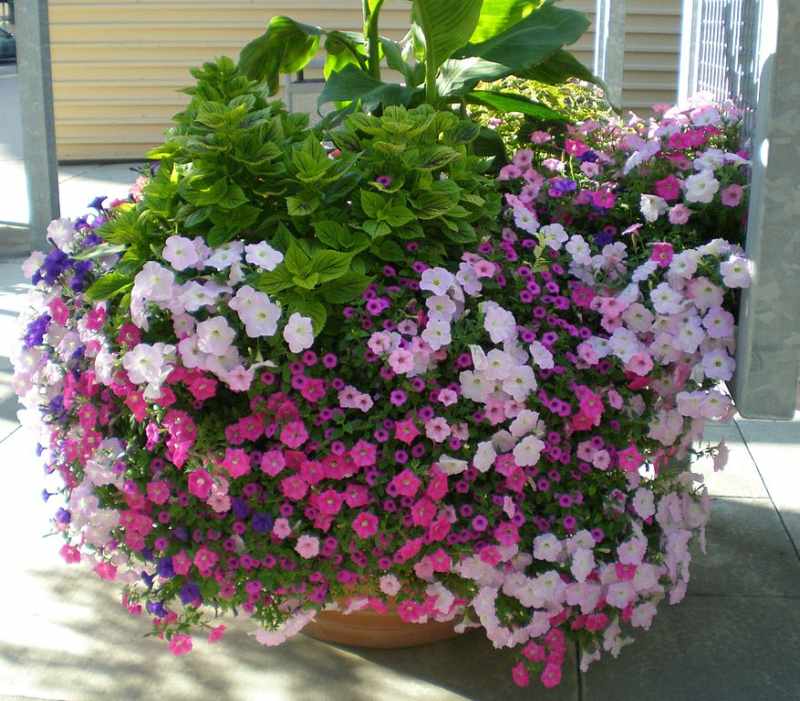
Photo Credit: ElenaSchifirnet / Wikimedia Commons / CC BY-SA 3.0
Container gardening is a versatile and low-maintenance way to create a beautiful landscape in Louisville. It allows you to grow plants in various container types and sizes, making it perfect for homeowners with limited space, such as a small front porch or balcony. Container gardens can include anything from flowering plants, herbs, and vegetables to small trees and shrubs.
Some plants suitable for container gardening in Louisville include:
- Coral Bells (Heuchera species)
- Petunias (Petunia x atkinsiana)
- Begonia (Semperflorens Cultorum Group)
- Dahlia (Dahlia pinnata)
- Creeping Jenny (Lysimachia nummularia)
Advantages of container gardening:
- Space-efficient
- Portable and flexible
- Easy to maintain
- Opportunity to recycle
- Allows for better control of soil and growing conditions
Estimated cost: The cost of container gardening depends on the container type, size, and the plants you choose. On average, expect to spend between $5 to $50 per container and $3 to $20 per plant.
FAQ About Low-Maintenance Louisville Landscaping
Newly planted native plants may require regular watering during the establishment period, which typically lasts for one to two years. Once established, most native plants can survive on rainfall alone. However, during periods of prolonged drought, it may be necessary to provide supplemental water to help them thrive.
Hardwood mulch is the most popular choice for Louisville gardens, as it is locally available and works well with the area’s native plants. Additionally, hardwood mulch breaks down slowly, providing nutrients to the soil and suppressing weeds.
Hardscaping is an excellent option for Louisville’s climate, as it is durable and able to withstand the region’s temperature fluctuations and precipitation patterns.
Professional Louisville Landscape Maintenance
Creating a low-maintenance landscape in Louisville is possible with the right plants, hardscapes, and techniques. By considering the local climate, hardiness zones, soil types, and native plants, you can design a beautiful and sustainable outdoor space.
Moreover, by including groundcovers, perennials, and native species, you can save time and energy and support a healthy ecosystem for pollinators.
Don’t hesitate to explore more options in creating a low-maintenance landscape for your home. Connect with local lawn care professionals who understand the unique needs of your region. This way, you can get back to relaxing and sipping mint juleps without worrying about your lawn’s upkeep.
Main Photo Credit: Jambu2021 / Wikimedia Commons / CC BY-SA 4.0